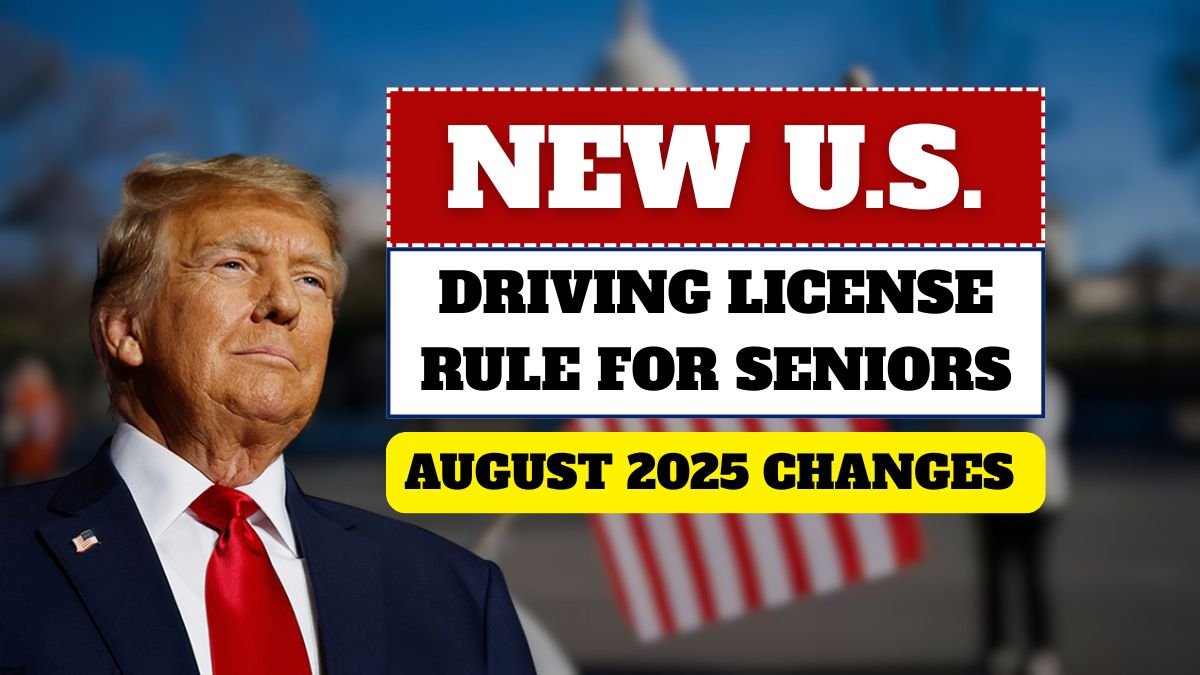New U.S. Driving License Rule: From August 1, 2025, a new historic driving law is coming into effect in the US that is specifically designed keeping in mind citizens aged 70 years and above. This law has been brought by the U.S. Department of Transportation and its aim is to improve road safety, but in a way that the independence and self-reliance of the elderly is not hampered in any way. The number of senior citizens in the US is constantly increasing, and in such a situation the government has had to find a solution that balances both safety and respect. This new rule makes the license renewal process more practical and health-based so that senior citizens do not feel neglected and the safety of other drivers can also be ensured.
Why is this change necessary?
According to recent data, there are about 48 million citizens in the US who are 65 years or older and who have a valid driving license. This number will increase further in the coming years, as life expectancy is increasing and people are staying physically active for longer. Many of these seniors drive themselves to get to the doctor, get groceries, or visit friends and family. But aging naturally brings with it certain changes—such as declining vision, poor decision-making ability, slower reaction times, and sometimes memory issues.
Taking all these factors into account, this law breaks the notion that driving ability fades with age. On the contrary, this law recognizes that every individual is different, and it is wrong to weigh all seniors on the same scale. Therefore, now license renewal will be completely based on the person’s health status and mental and physical ability, and not just age.
Key points of the new law: How will the license be renewed now?
Under this law, the process of renewing a driving license for senior citizens is now divided into different stages based on age and health. Its purpose is to ensure that those who are capable can drive without any hindrance, and those who are gradually losing this ability should be gradually moved towards alternative solutions.
| Age Group | Renewal Requirements |
|---|---|
| 70–79 years | Standard renewal with vision and reaction test |
| 80–86 years | In-person renewal every 2–4 years at the DMV |
| 87 years and above | Annual road test and mandatory medical clearance |
The purpose of this hierarchical system is that one’s driving ability can be evaluated correctly from time to time. The special thing is that if a person is completely fit, he will not be prevented from driving only on the basis of age. But if someone is becoming physically or mentally weak, then keeping in mind his safety and the safety of the society, his license can be limited or alternative options can be suggested.
Which tests can be made mandatory?
According to the new rules, some special tests can be made mandatory depending on the state and the person’s condition. Prominent among them are
- Vision Test: To see whether the driver’s eyes are still suitable for safe driving or not. This test will be made mandatory if there is even a slight decrease in vision.
- Cognitive Screening: This tests whether the driver’s decision-making ability, memory and reaction time are appropriate for safe driving. This is especially important for those over 80 years of age.
- Road Test: Those 87 years and older must pass a behavioral test on the road every year. This test can also be done if a doctor or family member expresses concern about an elderly person’s driving.
Can an elderly driver be reported?
Yes, if a family member, caregiver or doctor feels that an elderly person’s driving is no longer safe, they can report it to the state’s DMV (Department of Motor Vehicles). But this report should only be based on genuine concern, not due to any personal annoyance or disagreement. The DMV can re-examine the driver based on that report and make an appropriate decision if needed.
Variations by state—not one-size-fits-all
While this law will be enforced at the federal level, each state will have its own implementation. Some states will enforce the rules strictly, while others may be flexible. For example:
- California: Requires a personal appearance at a DMV office for every renewal after age 70.
- Florida: Mandatory vision test after age 80.
- Texas: Required annual DMV reporting after age 85.
- New York: Those over 80 may be required to have a doctor’s certificate.
Restricted driving license—security with freedom
For some seniors who can still drive, but not fully, the DMV will issue a “restricted license.” This may have certain restrictions:
- Driving only during the daytime.
- Driving only in local areas.
- Highway or long-distance driving may be restricted.
This way, the senior citizen will maintain independence for their daily needs but will be less vulnerable.
When driving is no longer safe—what are the options?
If it is no longer safe for an older person to drive, they do not have to lose independence. There are many options available today:
- Ride-sharing apps like Uber and Lyft
- Community shuttles and paratransit services
- Senior volunteer driving programs
- Family or friend support
These options allow seniors to travel for their needs without driving themselves.
Conclusion: A step towards road safety with dignity for seniors
This law, which comes into effect on August 1, 2025, is not just a legal change but a social initiative. Its aim is not to deprive seniors of independence but to keep them safe—for themselves and for others. If implemented properly, this law will make a major contribution to road safety in the US for years to come. It will also ensure that seniors can meet their needs with dignity.
FAQs
Q. What is the new law for senior drivers starting August 2025?
A. The U.S. Department of Transportation will require additional tests for drivers aged 70 and above, including vision, reaction, or road tests based on age.
Q. Will my license be taken away just because I turned 70?
A. No. The law focuses on ability-based assessments, not automatic revocation due to age.
Q. How often do I need to renew my license after age 80?
A. Drivers aged 80 to 86 must renew their licenses in person every 2 to 4 years.
Q. What tests will seniors need to take under the new rules?
A. Tests may include a vision test, cognitive screening, and for those over 87, a road test and medical clearance.
Q. Can someone report an elderly driver to the DMV?
A. Yes. Concerned family members or doctors can report a senior driver for safety evaluations, but only with valid concerns.


